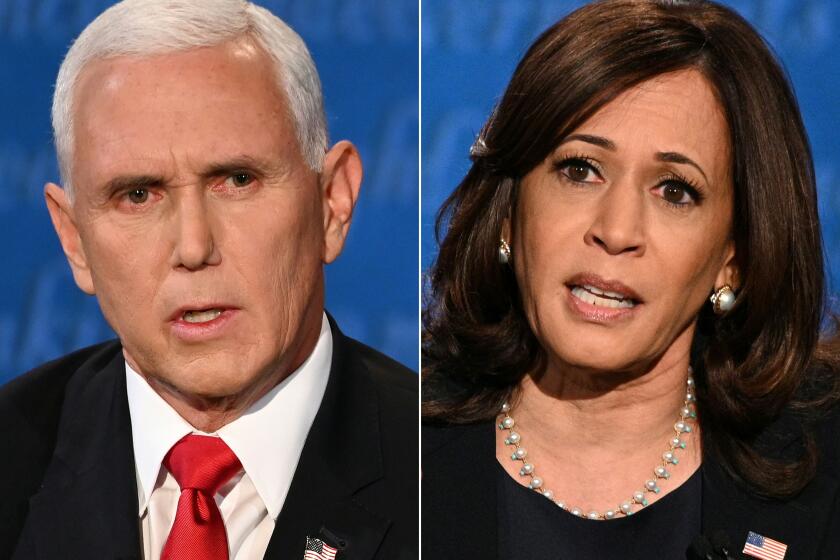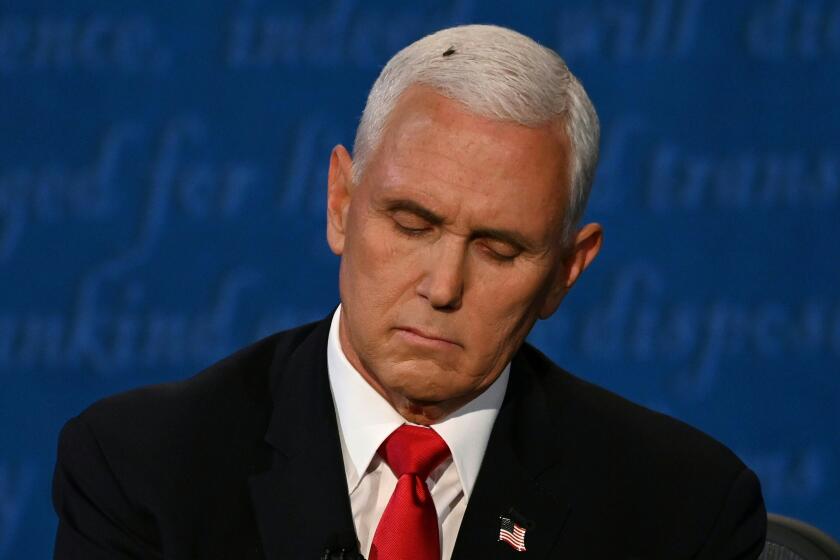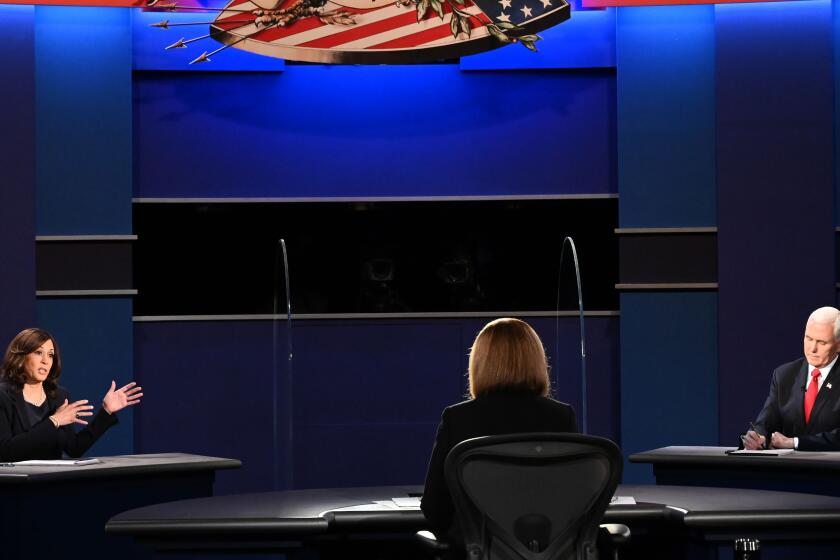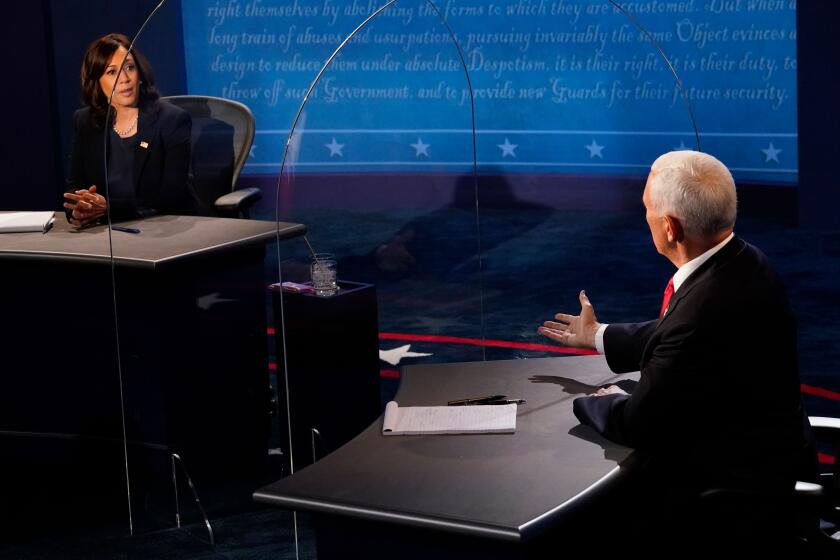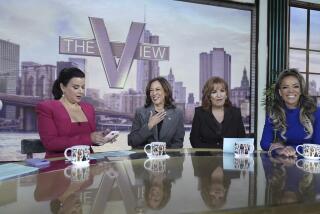Takeaways from the vice presidential debate between Harris and Pence
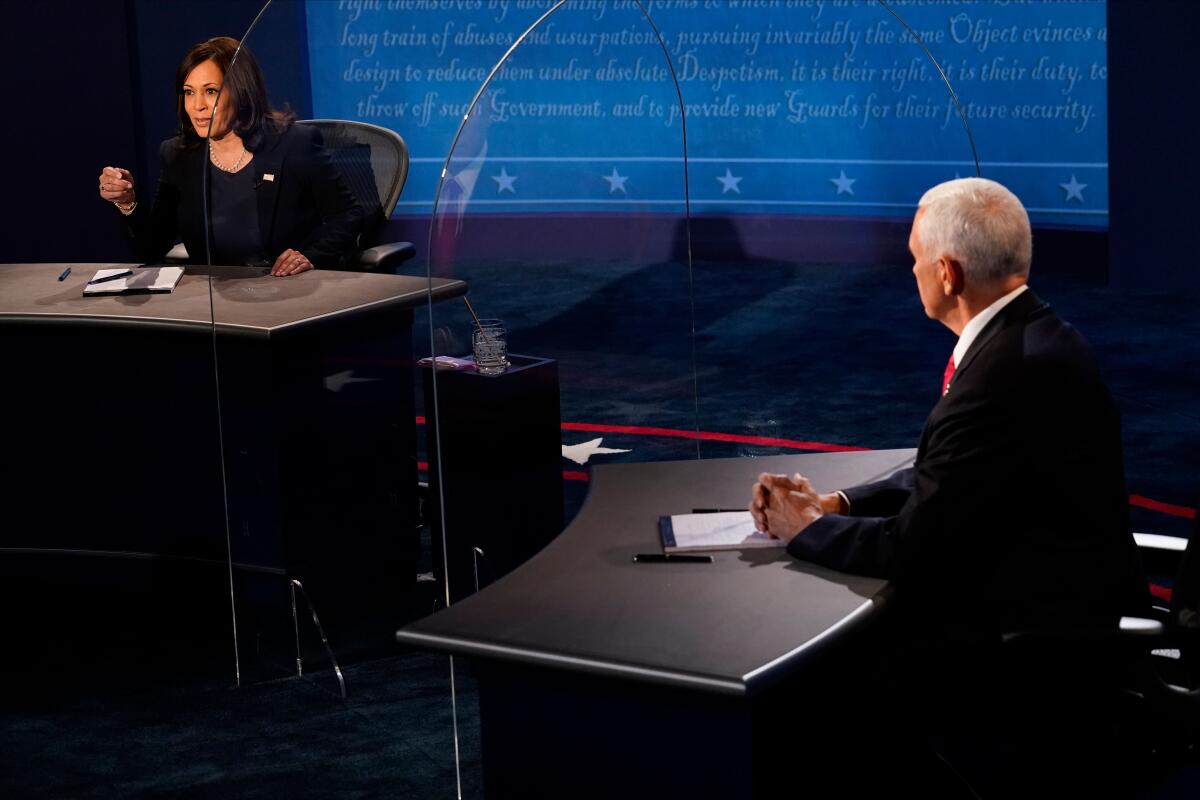
For 90 minutes, the understudies had their moment.
Vice President Mike Pence and California Sen. Kamala Harris faced each other Wednesday night behind plexiglass partitions in a low-key debate that was peevish but generally polite.
Their clash probably won’t have much effect on who wins the White House — a housefly may have stolen the occasion — which made the session like every other vice presidential debate: a good deal of sound and fury, signifying little to nothing.
Still, as political theater it had its moments.
Here are several takeaways:
Vice President Mike Pence struggles to revive the flagging Trump campaign as Sen. Kamala Harris rebukes the administration over its COVID-19 response and more in the pair’s tense but relatively civil debate in Salt Lake City.
Harris on the case
For well over a year, Democrats have drooled at the prospect of California’s former attorney general on a debate stage prosecuting her case against the Trump administration.
She was tough and firm, but didn’t exactly mop the floor with her Republican rival.
Harris set an accusatory tone with her very first response, to a question about the COVID-19 pandemic. “The American people have witnessed the greatest failure of any presidential administration in the history of our country,” she asserted.
She kept it up.
Harris attacked Trump for paying little or no federal income taxes over the past decade. She claimed he set off a failed trade war with China and endangered the country’s safety with a feckless foreign policy. She said he pandered to white supremacists.
Harris also assailed Pence’s honesty — “I think this is a debate that’s supposed to be based on facts and truth” — and bristled when he interrupted her, using a stern voice to reclaim her time. “Mr. Vice President,” she chided, “I’m speaking.”
Much of the night the senator wore an expression of incredulity, as though she could barely restrain herself from laughing, or rolling her eyes at Pence’s solemn defense of the president.
During the vice presidential debate Wednesday, many were fixated not on the arguments — but on Mike Pence’s left eye and a fly in his hair.
But for all of Harris’s head-shaking and the occasional grimace, she never managed to knock Pence off his metronomic delivery of talking points and scripted attacks, which he delivered in a modulated tone that never rose to a level of Trumpian thunder.
Ice not fire
Critics and even some friends of the tempestuous president have suggested the need for a grownup in the White House, to present a more sober and serious face to the world. That task frequently falls to Pence, a stolid Midwesterner and devout Christian.
On Wednesday night, the vice president wore his stoicism like a drab-colored cloak, seldom varying from the steady mien that has been his default countenance as a congressman, Indiana governor and unshakable Trump loyalist.
But calm did not equal nice. He did a lot of man-splaining.
He also accused Biden of stealing the administration’s plan to fight the pandemic. “It looks a little like plagiarism, which is something Joe Biden knows a little bit about,” Pence said, a dig at the scandal that forced the former vice president to abandon his first White House bid in 1987.
Pence just squinted and shook his head lightly when Harris charged that Trump had “lost that trade war with China.” Biden should talk, Pence said, he’s “been a cheerleader for communist China” for decades.
Kamala Harris and Mike Pence met in Utah for the only 2020 vice presidential debate. We analyzed the debate, round by round.
“They want to bury our economy under a $2 trillion Green New Deal,” he said, claiming the Democratic plan to fight climate change — which Biden has kept at arm’s length — would “ cost hundreds of thousands of American jobs all across the heartland.”
COVID front and center
Pence’s heaviest lift may have been persuading Americans that he and the rest of the Trump administration have done a bang-up job on COVID-19, even as the president could plausibly be labeled a super-spreader of the virus that has killed more than 210,000 Americans.
Polls show most voters don’t buy Trump’s efforts to equate COVID-19 with the common flu or, for that matter, his overall handling of the pandemic. (Would all those health precautions — protective shields, extra social distancing — have been necessary on the debate stage if the disease wasn’t so dangerous?)
Pence, who heads the White House Coronavirus Task Force, faces his own credibility problem, having steadfastly refused to call out the president’s repeated reckless claims.
“I want the American people to know from the very first day, President Trump has put the health of the American people first,” Pence insisted Wednesday night.
But Harris had none of it, saying Trump and Pence had learned of the danger of COVID-19 in January but chose not to share that information with the public until the president did so in March.
“They knew what was happening and they didn’t tell you,” Harris said. “They knew and they covered it up.”
Our take on the first and only debate between vice presidential candidates in 2020.
Pence vs. Biden
One thing hasn’t changed since the 2016 campaign: when Trump is front and center, he suffers politically.
The challenge for Pence — as it has been for Trump throughout the contest — was getting voters to focus on something other than the country’s struggle against a once-in-a-century pandemic and the resulting economic slide.
That means, in political shorthand, turning the race from a referendum on Trump to a choice between the incumbent and Biden.
Pence, who spent much of the evening on the defensive, did what he could. He painted a picture of economic ruin under a Democratic administration, saying Biden and Harris would make America a place of “new taxes, new regulation and economic surrender to China.”
Ridiculous, Harris shot back: “You and Donald Trump have reigned over a recession that is being compared to the Great Depression.”
Stealing the show
Historians may little note nor long remember the events of Wednesday night, but at least a lot of people had a good laugh.
A fly with a seemingly inordinate interest in Pence’s snow-white coiffeur landed on the vice presidential scalp and lingered for what seemed a very long time. The fact the insect arrived during a discussion of systemic racism — a notion Pence rejected — was taken by some as commentary.
“I saw the fly basically going ‘Say what?’” CBS News personality Gayle King tweeted. “It was very interesting.”
The Twitter handle @MikePenceFly immediately emerged, with its proprietor claiming, “Everyone jealous because I got the best seat for the debate tonight.”
Democrats quickly chimed in and — why not? — immediately sought to monetize the moment. Biden tweeted out a picture of himself holding a fly swatter and a plea to his fellow Americans: “Pitch in $5 to help this campaign fly.”
The Biden Victory Fund came up with its own model, a $10 number promoting “Truth Over Flies.”
Modeling better behavior
There was no name-calling, no personal insults, no taunting or belittling of the moderator, Susan Page of USA Today.
Neither Pence nor Harris shrank from attacking the other, or taking a shiv to the candidates atop their ticket. Pence repeatedly disregarded Page’s instructions, his voice low but insistent, speaking over his rival and ignoring the questions he was asked.
Covering Kamala Harris
Still, the back-and-forth was relatively tame compared to last week’s political hissy fit, er, presidential debate — admittedly a bar so low it scarcely cleared the ground.
There were even fleeting moments of grace.
Pence told Harris “it’s a privilege to be on the stage with you,” thanked her and Biden for the good wishes they extended the president and First Lady Melania Trump after their COVID-19 diagnoses, and noted the historic nature of her candidacy, as the first Black woman and Asian-American to run on a major party ticket for vice president.
If the debate Wednesday night didn’t move the needle on the presidential race, at least it pointed toward a somewhat more civil way of campaigning for president.
More to Read
Get the L.A. Times Politics newsletter
Deeply reported insights into legislation, politics and policy from Sacramento, Washington and beyond. In your inbox three times per week.
You may occasionally receive promotional content from the Los Angeles Times.
